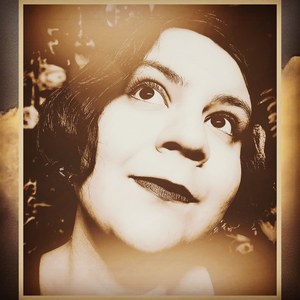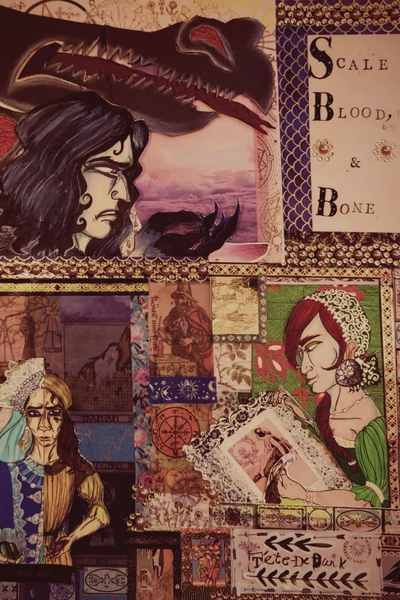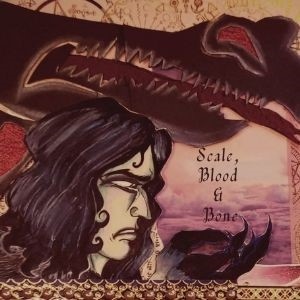“Wait!” a wide-eyed Abi exclaimed. A feat for even her own father, he managed to hold his daughter captivated throughout his recollection.
But Abi was now lit with animation-a shiver of wonder jittered her.
Ruvi, however, remained fixed in his spot besides his mother, ruminating with a brow bent in serious reflection.
“You were the baby, then! And your Mama was a queen! That’s why they called you Prince! You were a prince!” Abi gushed as she squirmed out of her seat and jumped down.
“Does that make me a princess, Papa?” Abi asked, blinking. She liked the idea of such a possibility. It meant she could lord over her brother with a right, she reasoned in her child’s mind.
But Ruvi finally spoke up, tilting his head questioningly. “The old god said Chana’s baby would be a queen, too- were you a queen, Mama?” He deduced the Malka the god mentioned must be the same Malka, his own mother.
Their mother closed her eyes and smiled knowingly, for she knew the truth well.
“I shall tell when it is time- but it is not my part of the story yet, Ruvi.” She then looked at her husband, who watched Abi’s excitement spark like a firecracker, as the girl launched into her future plans if she was indeed a princess. “Zhuel- the prince grows up, does he not?”
The father now beckoned his jumpy daughter onto the seat of his lap, which Abi hopped unto, still squirming and now dangling her legs, knocking them back and forth restlessly, still fueled by the idea of her own authority.
A pensive look dimmed their father’s face, as he reflected to share his own shortcomings in the next part of his story. He sighed, and holding Abi close, he rested his chin on top of her wavy hair. “To answer your question, Abi- yes, that was me. And you are the master of your own destiny- that’s even better than being a princess.”
“Why is that, Papa?” Abi began pouting. She preferred the notion of ordering others under her will.
Zhuel, their father, lifted his chin from her crown of red curls, and pulling her back an inch, looked at her thoughtfully. “Because you’ll find out being a prince isn’t a happy fate- nor was I very good at being one, either.”
Abi’s excitement dwindled. She grew serious. Her legs ceased dangling and she grew still.
“Tell us, Papa, please.” Abi asked.
Zhuel began his story.
************
It began as soon as he gained speech. It alarmed Rukhel.
Her sharp-eyed babe now grew into a quiet lad of 4 years. He was sharp, too sharp for his age. But he, she saw through his face’s expressions, understood too much, but his tongue faltered.
He had much to say, but had no power to speak what his mind desired to issue forth.
It was, Rukhel hated and lamented, a cursed stutter. Her son scarcely formed a complete word, save it was shattered into a shiver of letters and trailed off into nervous and shame whispers.
Frustration first came when he could not say what he wanted. Then shame. Then sullenness.
Rukhel sought tutors and sorcerers, even a shaman from a distant land- none wielded any cure for his son’s impediment.
These wise ones grew vexed with Zhuel, and thought him unwilling- Zhuel thought the same of them, for he took great pains.
Lessons and rituals intended to cure him ended in fruitless failure. Rukhel casted out these wise ones, whom she now saw as foolish, and tried consoling her son.
She wrapped her arms around her small son, still small for his age, a skinny, pale thing, as though her arms served as a sufficient shield against a world which would turn cruel onto her son’s inability.
Zhuel, further shamed by what, in his childish mind, reasoned was his own measure of failure, cried into the bosom of his mother, hiding his face.
But Rukhel would draw him back, hold his face and told him, sharing her son’s pain, “Beloved son, know I understand all. No need words for me, Zhuel.”
“But the world will not be so kind.” She whispered to herself as she held him again.
He was still young. The workings of government concerned him not, so Zhuel sought first the quiet company of his father, Penzsas. Penzsas was content to remain in the shadow of his wife, and remained humble. He set his own workshop in the palace and continued crafting oddities and useful goods from scraps of wood and metal. Here, in the workshop, Zhuel found his first source of sanctuary from the judging eyes and dismissive whispers of his mother’s court and the people. Zhuel found relief from his bullying peers as well.
He savored his father’s company. Penzsas spoke little. He lived through tinkering and thinking silently, and he formed his own of conveyance through looks, a knack Zhuel inherited perhaps from him, and certainly from the relentless gauntlet Zhuel endured from his peers.
Zhuel desired no playmates, so Rukhel eventually ceased seeking out such for her son, and Zhuel was grateful for his solitude with his father. He took to tinkering, an unprincely pastime, but the lad enjoyed losing his thoughts in piecing something together, something useful. If only he could take the scraps of words he barely formed and could put them together through his voice, like he created with the wood and metal on the work bench.
Over time, Zhuel noted his father grew more silent. His kindness did not diminish, but his corporeal presence did. It was though Penzsas morphed into a plaintive shadow, barely existing.
In turn, though Zhuel still sought consolation in craftsmanship, however rudimentary, he learned reading and found a new refuge- a greater and vast refuge of an inexhaustible expanse- books.
Here, Zhuel ventured into this world. It welcomed him, free from damning judgement and scorn. It consoled him, for books offered knowledge that demanded nothing of oratory, nor bodily strength.
Each book contained a world unto itself, and therein, Zhuel found many worlds in every book he found in the library his mother built.
Rukhel, valuing knowledge, for it was the knowledge stored in texts that led her to her people’s god, proved dedicated in her acquirement of books. In her reign, Rukhel also took it upon herself to build upon her own reserve of knowledge, for being a queen, she shed aside her limited mind as a washerwoman.
And likewise, Rukhel determined her son should surpass her even still, although this, she knew, would be the impetus of the prophecy.
It was these hours of the day, closed off from the din and clamor of court and office, Rukhel found a jointed solace with her son. Likewise, Zhuel relished these brief hours when Rukhel took it upon herself to teach him the more complicated reading and writing. Rukhel found herself learning alongside her son, and in this, the mother and son shared a kinship over the word written and recorded- where the word spoken had divided and grieved them.
Zhuel, as he grew into adolescence, made the ever-expanding library his own domain. Rukhel let him have it so, for she held the court as her own, as well as her own office chambers.
But in his adolescence, the prince grew listless, despite his small and weak body.













Comments (12)
See all